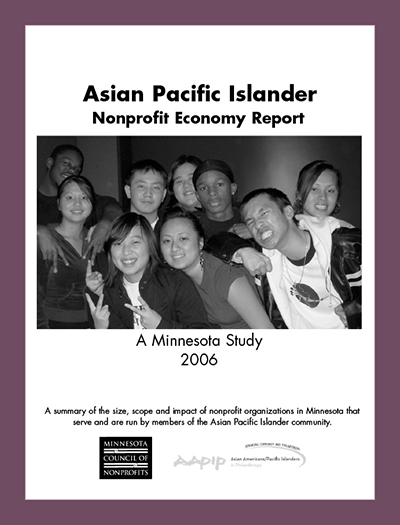The Minnesota Council of Nonprofits, in partnership with the Asian Americans/Pacific Islanders in Philanthropy Minnesota Chapter (AAPIP-MN), published the Asian Pacific Islander Nonprofit Economy Report in 2006 as an overview of nonprofit organizations led by and serving Minnesota’s Asian Pacific Islander (API) communities. The report highlights the number, size, geographic area served, types of services, and funding sources of API nonprofits.
Executive Summary
Overall, this report suggests that more can be done to better understand the contributions made by API nonprofits within API communities and the community-at-large and to address their concerns in managing and strengthening their organizations to serve APIs, especially their financial situations. As a result of the report findings, the Minnesota Council of Nonprofits and Asian Americans/Pacific Islanders in Philanthropy Minnesota Chapter (AAPIP-MN) are making 13 recommendations in three areas: board and executive leadership, relationships among organizations, and philanthropy.

Principle Findings:
- Research finds that 75 API nonprofits either exceed the $25,000 in annual revenues (the threshold requiring them to report their financial information to the Internal Revenue Service and the Minnesota Attorney General’s Office) or report their financial information voluntarily. Twenty-two of these API nonprofits responded to the MCN online survey during January – June of 2004. Twenty-one of those respondents also multi-year financial data publicly available.
- Most API nonprofits (94 percent) are tax-exempt organizations. The length of time they have been in operation ranges from a minimum of less than a year to a maximum of 33 years. The average number of years in operation is currently 11.6 years.
- The majority of API nonprofits operate in the Twin Cities Metro area, where the largest API communities are established, especially recent immigrants. Many organizations involve or serve several different API ethnic groups as well as serving non-API persons.
- Most API nonprofits reported offering programs and services during 2004. The number of persons served ranged from a high of 55,000 to a low of five with higher numbers reported by arts and culture organizations that offer performances and other cultural events. Organizations providing human services, education, and similar programs were generally in the range of 300 to 4,000 served in 2004.
- API nonprofits play an important role in serving API communities, including high percentages of low income individuals (77 percent) and/or recent immigrants (17 percent).
- API nonprofits, particularly those providing human services, education, and similar programs, obtain their revenues primarily from grants, government contracts, and other charitable contributions.
As a result, their finances are vulnerable to volatility in foundation funding and government spending, especially during the 2000 economic recession. - API nonprofits reported employing an average of 8.4 full-time staff and 7.6 part-time staff. An average of 61.4 volunteers are utilized.
- API nonprofits are largely governed by the leadership of Asian Pacific Islanders on the boards of directors.